Can Cannabis Help Fight The Common Cold and Flu?
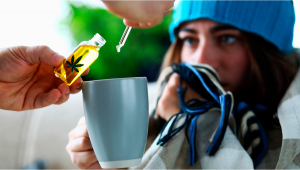
- 1. What causes a cold or flu?
- 2. Why medications are bad for you
- 3. Don't smoke when you have a sore throat
- 4. Why edibles are the perfect solution
- 4. a. Cooking edibles to make time pass by
- 4. b. Slow-cooked cannabis coconut oil
- 5. The best edible recipes to make if you are suffering from a cold or flu
- 6. In conclusion
It starts with some coughing, a runny nose, then a sore throat, and perhaps an exhausted body. Add up a fever and heavy headaches and you could well just affirm that you've got the common cold or flu, you thought we were heading direction covid huh?
Colds and flu always come wandering around sometime in our lives, most of the time when somewhere in our body there's something feeling weaker and it lets these demons in, throwing us into bed for a week or two when you're lucky it doesn't go on for longer. We know these days can be a total nightmare, feeling already annoyed at the malaise itself and having nothing to do but lay in bed until you get better. But what if we told you that cannabis could be your best ally for treating a cold and flu?
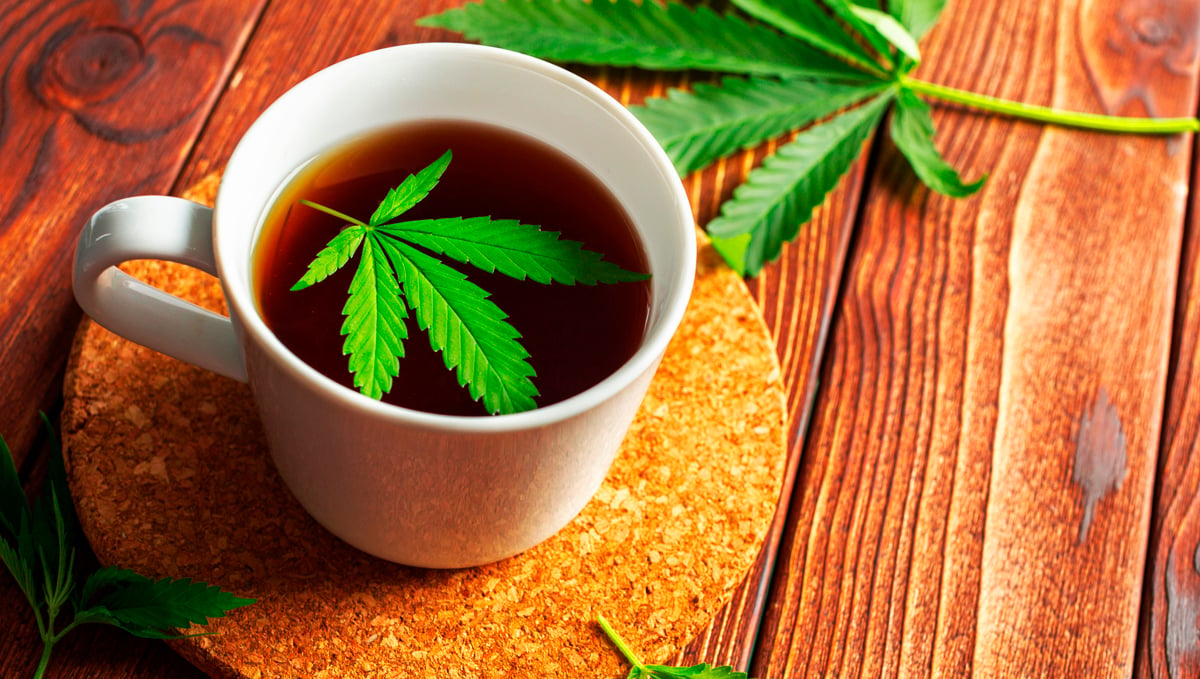
Marijuana is famously known for its pain-relieving, anti-inflammatory, and sleep-inducing properties, which could help treat your cold or flu faster and make the entire process more bearable. Besides, cannabis is a 100% natural way of medical treatment. Given that nowadays people opt for natural ways of treatment more often, once science achieves to prove the medical benefits of cannabis for a cold or flu it will likely become one of the most preferred methods of healing. But let's see what experts have to say on the subject for now.
1. What Causes a Cold or Flu?
There are more than 200 different viruses that can cause the symptoms of a common cold. Perhaps as a kid, your mum might have blamed it on you playing outside on a chilly day but chances are the cold you caught was underpinned by the hundreds of microbes you came across in the playground, or the office years later.
We get sick after breathing in viral particles, most likely when we've been around someone who's ill and spreading it by coughing, sneezing, or simply breathing near you. You could also get infected by touching a contaminated surface and later touching your eyes, mouth, or nose.
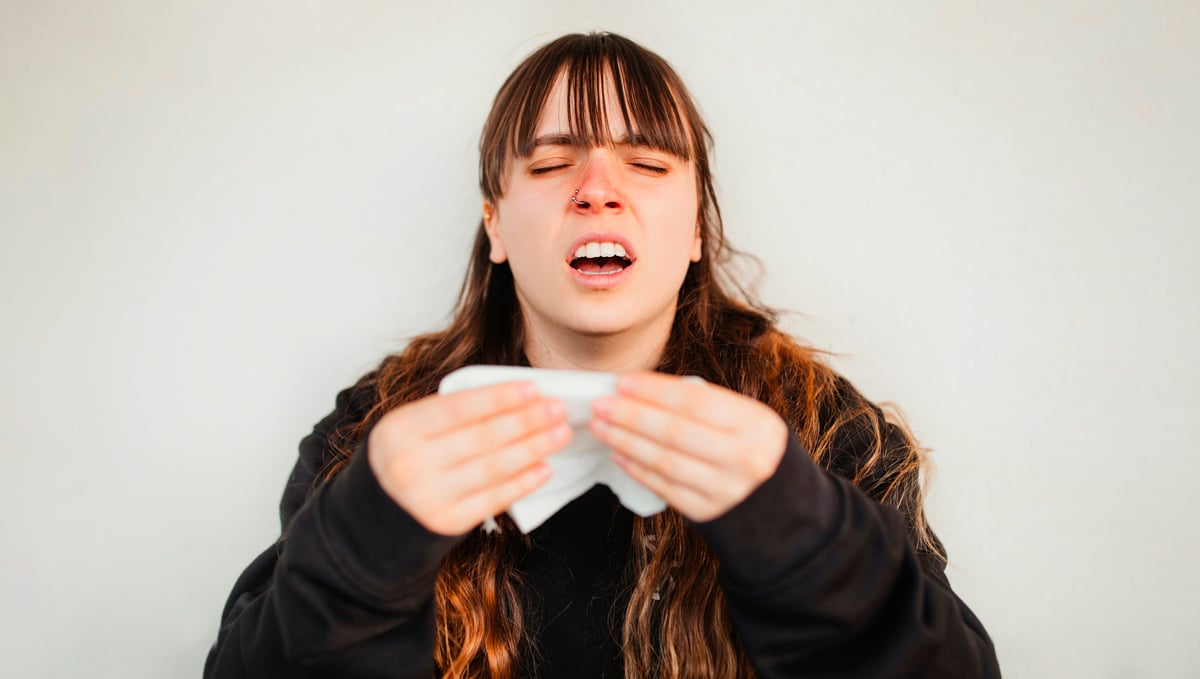
Sounds familiar? We're trying to dodge the monothematic subject of coronavirus, but the use of masks is the biggest and most clear explanation for these phenomena. While spring is the most common time for getting allergies, winter and autumn are the cold and flu seasons, coming along with symptoms such as:
| Symptoms | Cold | Flu |
|---|---|---|
| Fever and chills | Rare | Common |
| Aches | Slight | Usual |
| Fatigue, weakness | Sometimes | Usual |
| Sneezing | Common | Sometimes |
| Cough, hoarseness | Mild to moderate | Common |
| Sore throat, stuffy nose | Common | Sometimes |
Make sure you take note of these signs so you can restock your stash and get ready to try some alternative cannabis cold or flu healing.
2. Why Medications Are Bad For You
The most common medications people will go to as soon as they start feeling some minor cold or flu symptoms are the ones based on acetaminophen, ibuprofen, or naproxen, among others. However, there are a couple of downsides to taking these types of medications. Besides the fact that if weed is effectively a promising treatment for these symptoms, then it'll be undeniably the most fun way to treat a sickness, such over the counter medications tend to make the stomach sore as well after long periods of intake.
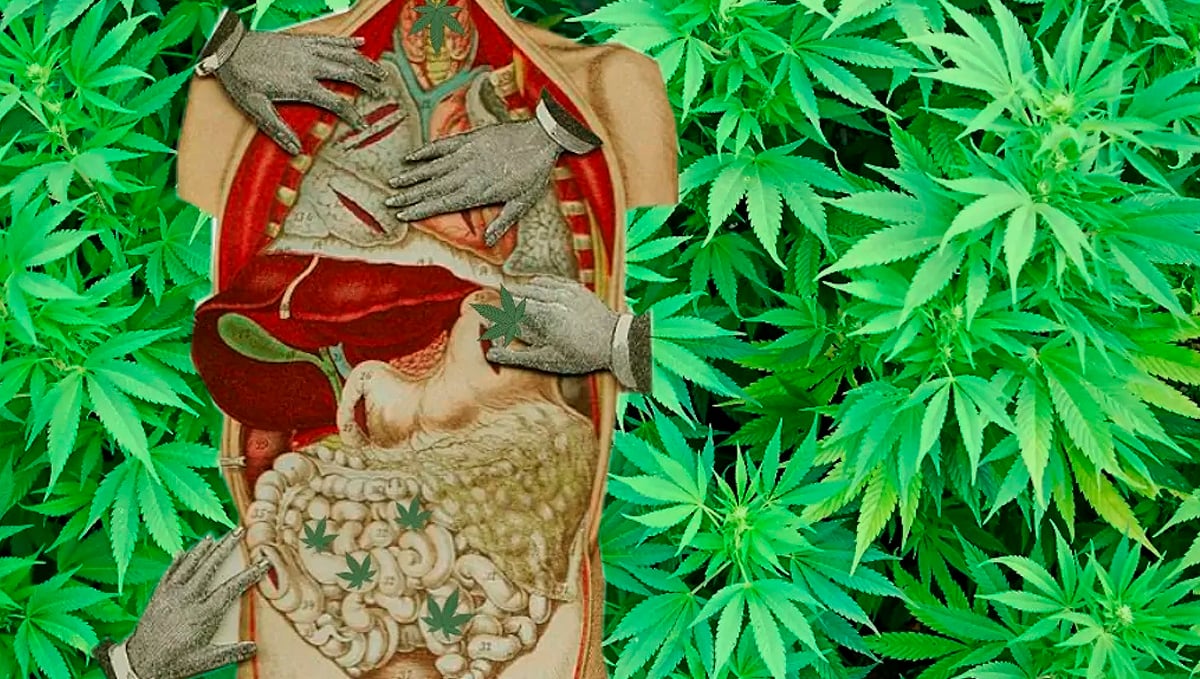
These non-steroidal drugs, which is the category where the most commonly used medications fit in, can lead to secondary effects such as inflammation of the stomach lining (gastritis), ulcers, bleeding and/or perforation of the lining. 1 Therefore, if you have a sensitive stomach, perhaps looking for natural medications is a better choice for you. And we aren't talking only about cannabis here, some people go for tea as their healing method of preference, honey, baking soda mixtures, garlic, and many other natural medications.
3. Don't Smoke When You Have A Sore Throat
When we mentioned cannabis could be an effective treatment for a cold or flu given its anti-inflammatory, pain-relieving, and sleep-inducing properties, we were not suggesting you went and lit up a joint or your bong with a painfully sore throat. In fact quite the opposite, if your throat is pounding in pain, definitely do try to skip smoking anything at all during these days, both tobacco and marijuana. Inhaling any sort of smoke even while we aren't ill isn't too healthy for our lungs and respiratory system.
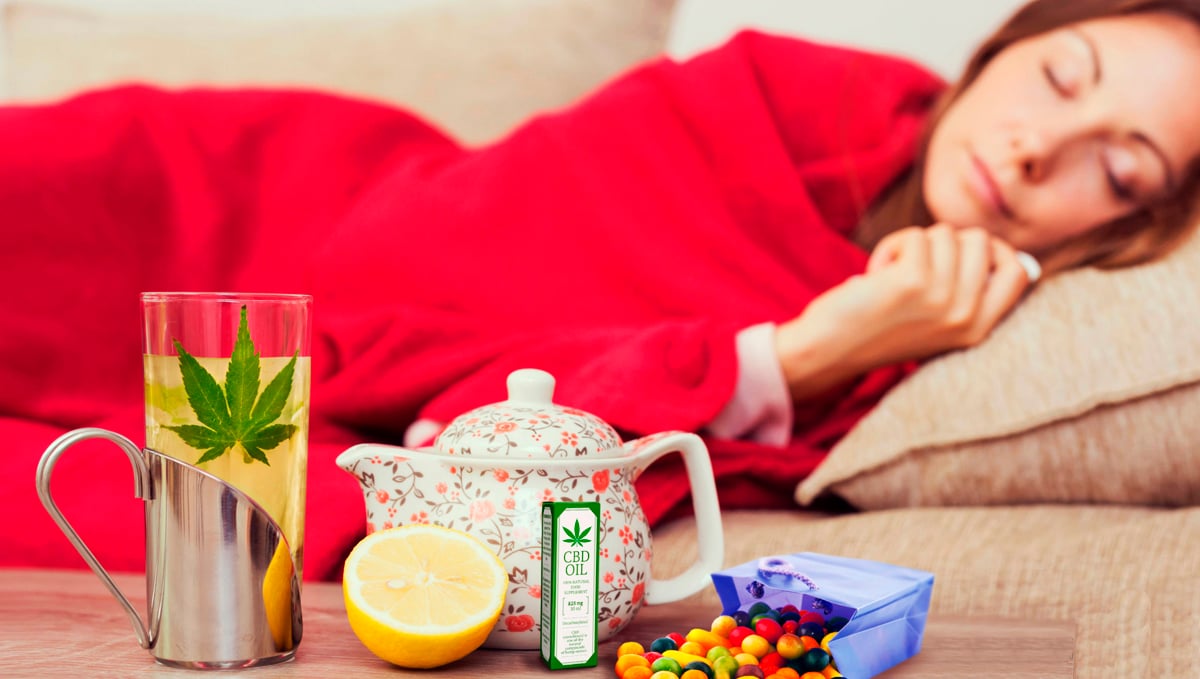
We all know coughing and smoking weed go hand in hand, we even hear it in songs, for example in the intro of Black Sabbath's "Sweet Leaf" or in Wiz Khalifa's "Young Wild and Free", therefore taking a break would probably be a smart move. One last counterpart of smoking cannabis while having a cold or flu is that marijuana also tends to block the nose. This is due to the vasodilation effect in its compounds, which is a term that refers to the result of blood vessels relaxing and expanding, hence the 'dilation' part of the term.
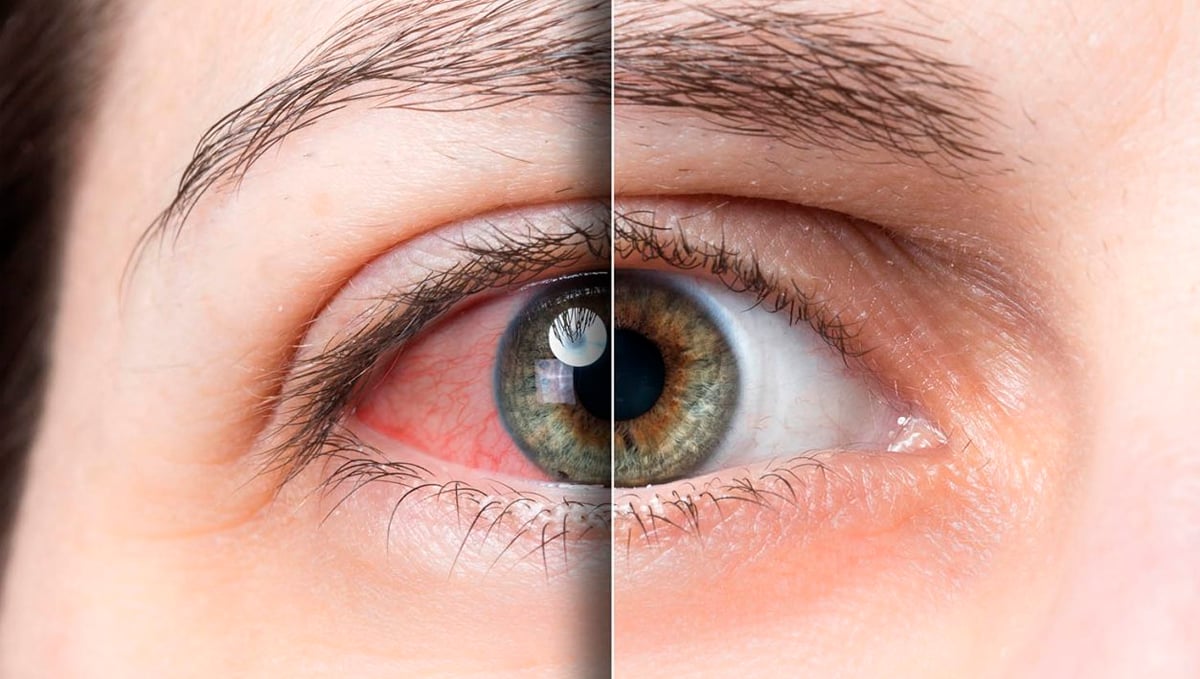
The tissue inside our noses is packed with tiny blood vessels named capillaries, which expand when smoking weed and for this reason, the stuffed nose is caused. The same goes for the puffy, red eyes effect, the white parts of our eyes have big amounts of blood vessels, which go through the same vasodilation process turning our eyes bloodshot red.
4. Why Edibles Are The Perfect Solution
So we come here telling you how cannabis can be a great alternative for treating a cold or flu and then we drop down the bomb with all the negative aspects it has and how it can even make things worse, we're sorry, we didn't mean to play with your feelings, we promise. We'd rather warn you so that you know what to expect, and you're the one making the call for your decisions.
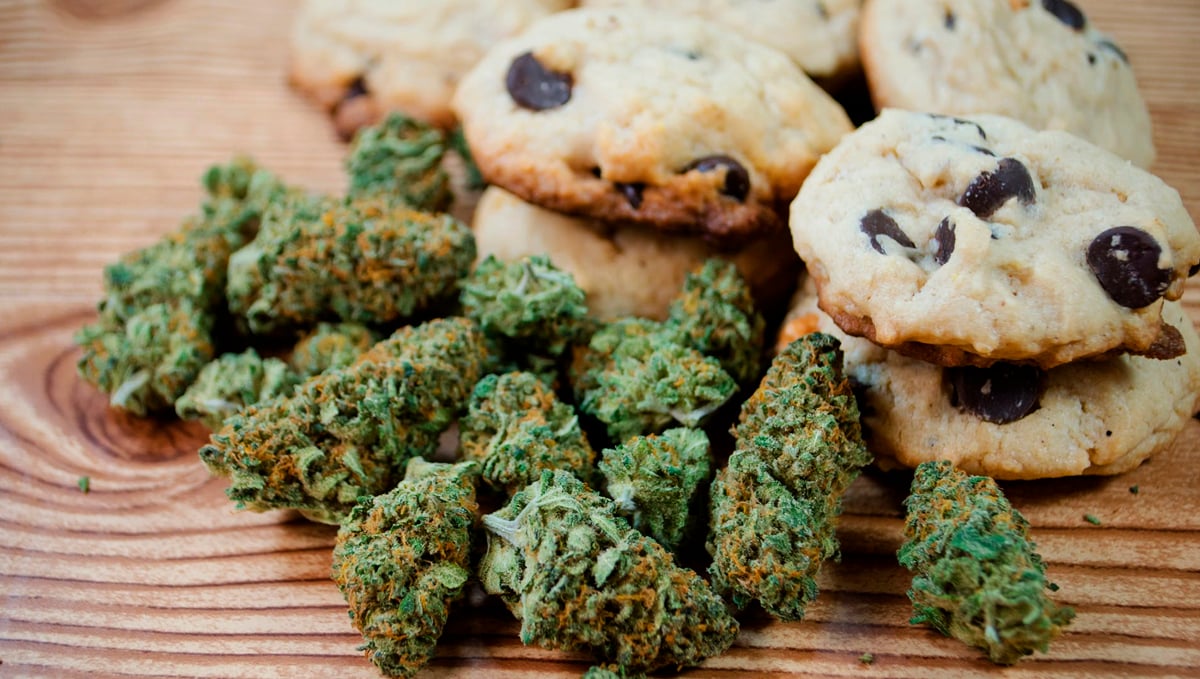
Besides, the truth is, this doesn't mean all cannabis alternatives are doomed, in fact, what we're trying to say is, smoking cannabis simply isn't the best of the options. What we are actually saying is that edibles are.
Safety AdviceAlthough cannabis has scientifically shown its huge amounts of health benefits, we would suggest first consulting with a doctor about the treatment for your cold or flu to avoid any unforntunate events, like prolonging the illness.
We know that marijuana edibles consumption provides a huge amount of health benefits, apart from being something extremely fun to experience. The main reason why we suggest you opt for edibles, although vaping is also a better alternative to smoking too, is because there is no inhaling more than breathing involved in this consumption method. No smoke, healthier or unhealthy, traveling into your lungs.
This means edibles could become the best source of medication for many treatments given they don't affect your gastrointestinal system, they still supply our bodies with the health properties of famous cannabinoids like THC and CBD, and they last for prolonged periods of time, and they even taste good. When has an efficient medication ever tasted good?
Cooking Edibles To Make Time Pass By
There are a few feelings worse than boredom, the utter nothingness, wandering around the house like a ghost having no idea what to do. Add feeling sick and the ghost just became paler. The thing is, as entertaining as watching Netflix can be, when a doctor comes telling us we must rest, it seems as if our hearing system often interprets this in a rebellious way, and resting becomes the last thing we want to do (or perhaps this is just us?).
So we find our bodies are screaming for rest but our bored brains are scratching our scalps out trying to find fun things to do, and after one or two days, there aren't even sufficient TV hours to cover for that boredom, it simply won't do. We can't really do anything, or anything that requires physical effort because the body is fatigued and moody.

You've already spent hours reading, maybe you fell asleep for a while and now you're wide awake, your head is pounding and the TV's screen light turns you into a vampire reacting to sunlight, what to do now? Time to jump off the bed! Ok no, slowly get up and head to the kitchen, it's time to cook some edibles!
You can take edibles both with raw cannabis or decarboxylated buds, here are some ideas:
- Green smoothies;
- Adding hemp oil to any recipe;
- Baking something;
- Sprinkling raw flowers on a salad;
- Or eating seeds!
Not only edibles will cure your cold or flu but they will kill your restless mood and boredom as well! While cooking some healthy and tasty cannabis brownies, cough-cough, the medication, you'll probably have some fun too, which will lift your puppy-faced mood. But before you chuck on your cooking apron make sure you've read the full guide on how to make the perfect cannabutter for your recipe. And don't forget to measure the right THC dosages for you before you eat the whole tray of brownies and end up feeling even worse.
Now that you're well informed it's finally time to spoil and entertain yourself during these days of illness and enjoy some healthy and tasty cannabis edibles remedies. A vegan alternative to cannabutter is canna-coconut oil. These days we usually suggest just going straight for the coconut oil actually, as it is way more versatile than cannabutter, and will last a lot longer. Let's quickly run through oil favorite recipe for the super delicious edible base that is canna-coco oil.
Slow-Cooked Cannabis Coconut Oil
There are a couple of different methods to make canna coco oil, but as the old saying goes - slow and steady wins the race. When making any medicated cooking oil or butter, the more you slow the process down, the better the final product (to a certain degree, anyway). If you have a slow cooker then grab that bad boy out, but it's definitely not totally necessary. If you are using a regular, everyday pot over a normal cooking hob just be sure to keep the temperature as low as possible.First things first, let's talk a little about dosage. A quick google search will show a bunch of different edible dosage calculators, and sure, these can be useful - especially if you know the THC and CBD percentages in the weed you are going to use. But there's another way you can think about it.
These days, good buds will usually have anywhere between 15% to 25% THC. When talking about edibles, the dose is always given in milligrams, but how do we work that value out? Let's say that we start with 5 grams of flower at 20% THC. If you could extract every last drop of THC that would give us 1000 mg, but the cooking process does involve some THC loss. The usual formula to work out this loss is super simple. For decarb loss, we just multiply by 0.9 (1000 mg x 0.9) which would leave us 900 mg, and then for the extraction rate while cooking we multiple again by 0.6 (900 mg x 0.6) which gives us 540 mg of total THC in the finished canna coco oil.
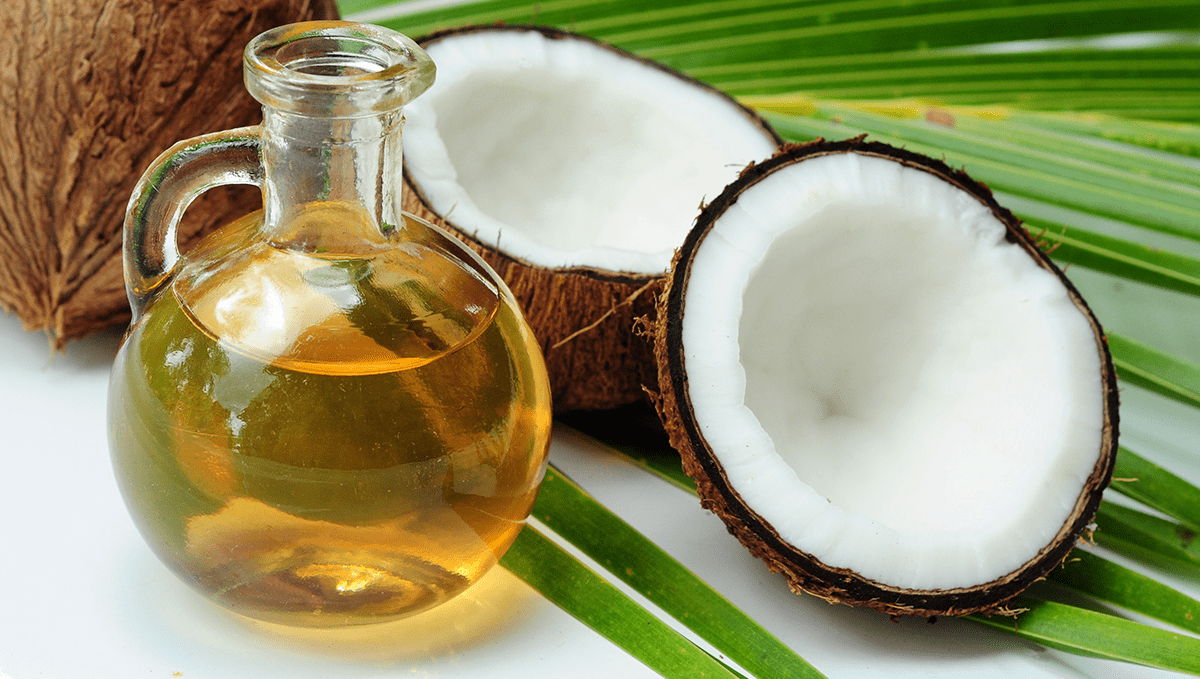
Since a recommended dose is anywhere between 5 to 10 mg depending on your tolerance, from 5 grams you end up with anywhere between 54 to 108 doses. Ok, onto the cooking process. First up, decarb your buds. To decarb, simply set your oven to the lowest possible setting, break up your weed, place it on a parchment paper-lined baking tray, and place it inside the low temp oven. Bake for about 20 mins you're done.
Next up, fill a pot (or your slow cooker) with 1.5 liters of water and get it boiling. Once it's boiling, add your coconut oil and reduce the heat until the whole thing is only just slightly simmering. Once you have added you evenly ground up weed let the whole thing cook for about an hour, then turn the heat off and let it sit for an hour. Repeat this heat on/off process at least 4 times (you can push it out to a whole 24 hours for the best results), and then use some cheesecloth to strain the whole thing into a glass bowl. Next up, sit the bowl in the fridge for an hour or so and the oil will separate and rise to the top. There you have it, your medicated coconut oil is ready! How much oil should you use? Well, that really up to you. Just remember, you can always add more oil after the cooking process is finished to make it weaker.
5. The Best Edible Recipes to Make if you are Suffering from a Cold or Flu
Ok, so you now know how to make a great, potents-as-all-hell batch of super delicious cannabis-infused coconut oil. While cannabutter used to be all the rage, we now much prefer using coconut oil for a few main reasons.
- Extra virgin coconut oil is a much healthier option than butter.
- It is more versatile.
- It carries terpenes, the aromatic compounds found in cannabis, better than butter.
- It is easy to dose.
- It keeps longer without spoiling (as long as you have strained all of the plant material)
- It is vegan-friendly
- It's just so delicious!
But what should this dosed oil be used for, if you are currently suffering from a cold or flu? Well, first up, you want to look for recipes that contain other ingredients that are known to help boost your immunity and reduce any and all cold or flu symptoms. These include garlic, ginger, honey, lemon, and turmeric.
You can add a teaspoon of your dosed coconut oil to just about any of these recipes to give a medicinal boost of cannabinoids and terpenes that can help reduce inflammation and fight off the virus. Here are some of our favorite edible recipes for when we are being knocked around by a cold or flu.
Dosed Honey, Lemon and Ginger Tea
Ingredients -
- Hot water
- Half an inch cube of ginger, finely grated
- One tablespoon of honey
- The juice of one small lemon (about an ounce or 30 ml)
- You can also add turmeric if you have it laying around
- 30 ml of canna-coco-oil
Method -
- First up, get that water boiling.
- While the water is heating up, grate your ginger and turmeric and chuck them into the mug.
- Squeeze the lemon into the mug, and add the tablespoon of honey and dosed oil.
- Pour the hot water into the mug, and give it a good old stir.
- Let it cool down just a little before sipping away.
If hot drinks aren't your thing, check out the next option...
Dosed Fruit Shake
Ingredients -
- Whichever fruit you prefer - we love a mix of pineapple and mango for when we are feeling a bit fluey
- One ounce of coconut milk
- One ounce of honey
- One ounce of dosed oil
- Ice
- 3 ounces of water
- Half an inch cube of ginger and turmeric
Method -
- This one is super simple - just throw all the ingredients into a blender and turn it up to full power for 30 seconds or so and you're done!
Dosed Chocolate and Ginger Cookies
Ingredients -
- 1 cup of room-temperature dosed oil
- 3/4 cup brown sugar (for a healthier option, switch out the brown sugar for honey)
- 1 teaspoon of vanilla extract
- 3 cups all-purpose flour
- One teaspoon of baking soda
- 4 ounces of ground ginger
- 1/2 teaspoon of salt
- 4 ounces of dark chocolate chips
Method -
- Preheat the oven to 350F.
- In a large bowl, mix together the oil and brown sugar until completely combined.
- Add the vanilla extract and mix again.
- In a separate bowl, combine the flour, baking soda, ginger, and salt.
- Slowly add the dry ingredients to the wet ingredients until it forms a cookie dough-like consistency.
- Fold in your chocolate chips and give it another good mix.
- Using an ice cream scoop or spoon, form your cookies onto a lined baking tray and press them down slightly.
- Bake for 8-10 minutes or until golden brown.
- Let them cool before tucking in!
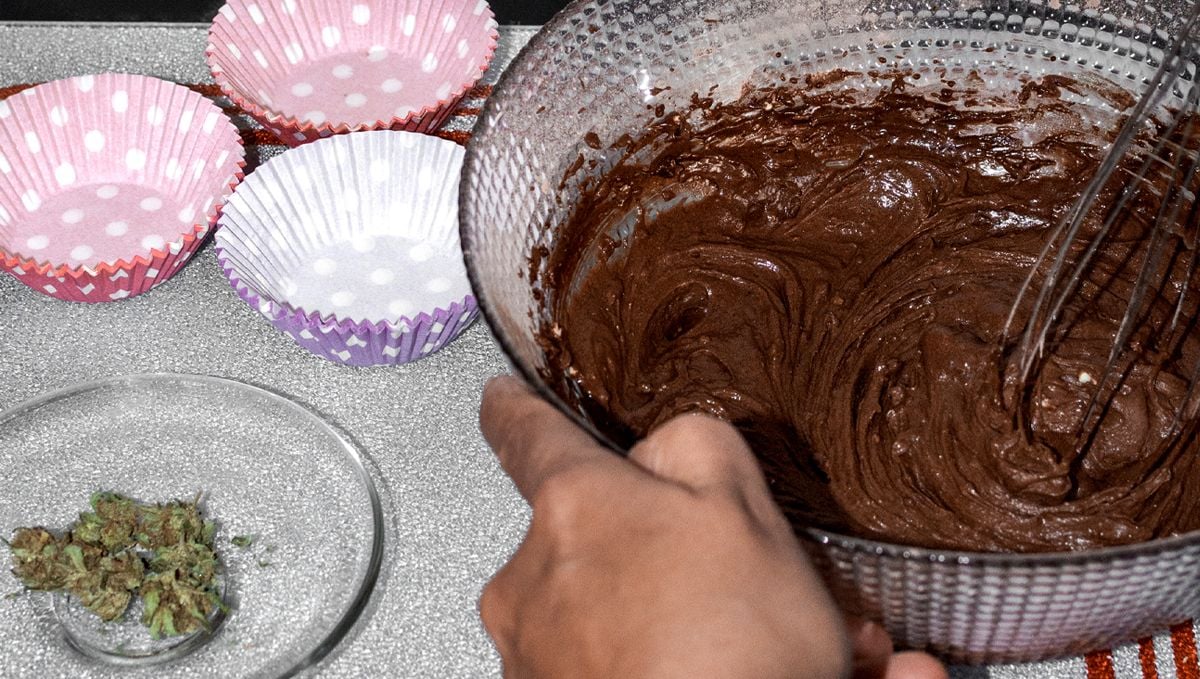
Dosed Bone Broth
Ingredients -
- 3 lbs of beef, chicken, or lamb bones
- 2 tablespoons of olive oil
- 1 large onion, diced
- 2 carrots, cut into pieces
- 2 celery stalks, cut into pieces
- 4 cloves of garlic, chopped
- 1 teaspoon of black peppercorns
- A handful of fresh thyme
- 1 tablespoon of apple cider vinegar
- 1 cup of dosed oil
- 12 cups of water
- Salt and pepper to taste
Method -
- In a large pot, heat the olive oil over medium-high heat. Add the onion and cook for about 5 minutes or until it becomes translucent. Add the carrots, celery, garlic, and peppercorns and cook for another 5 minutes.
- Add the bones to the pot and stir everything together. Pour in the apple cider vinegar, dosed oil, and water. Bring it all to a boil, then reduce the heat and let it simmer for about 8 hours (or overnight if you prefer).
- After 8 hours, strain the broth and discard the bones. Season with salt and pepper to taste.
- Your dosed bone broth is now ready to enjoy!
Dosed Ginger, Tumeric, Beetroot, and Rosemary Hummus
Ingredients -
- 1 can of chickpeas, drained and rinsed
- 2 tablespoons of olive oil
- 2 tablespoons of tahini
- 1 clove of garlic, minced
- 3 tablespoons of freshly squeezed lemon juice
- Half an inch cube of ginger, finely grated
- Half an inch cube of turmeric, finely grated
- 1 small beetroot, roasted and diced
- 2 teaspoons of fresh rosemary leaves
- 5 tablespoons of dosed oil
- 5 ice cubes
- Salt and pepper to taste
Method -
- Place all the ingredients into a food processor or blender. Blitz until smooth. If it’s too thick, add a little more water or olive oil.
- Taste and adjust the seasoning as needed.
- Serve it with toasted pita bread or crunchy veggies of your choice. Enjoy!
Dosed Ginger and Chocolate Bark Chips
Ingredients -
- 2 cups of dark chocolate chips
- 1/4 teaspoon of sea salt
- Half an inch cube of ginger, grated finely
- 3 tablespoons of dosed oil
Method -
- In a double boiler or in the microwave, melt the chocolate chips.
- Once melted, add the sea salt and ginger and stir until combined.
- Add the dosed oil and mix again.
- Pour the mixture onto a lined baking sheet and spread out evenly with the back of a spoon.
- Put it in the freezer for about 15 minutes or until completely set.
- Break into pieces and enjoy!
So there we go, all of the best (and most delicious) cannabis-infused recipes for when you are feeling a little under the weather. Enjoy!
6. In Conclusion
Medical cannabis doesn't fail to surprise us, it's all a matter of time until science makes its way forward in the subject, finds new discoveries, and makes official all the amazing health benefits we can obtain from cannabis consumption.
But for now, we'll have to deal with the few amounts of information available at the moment and our own and friends' personal experiences. If you've tried cannabis as a cold or flu treatment, please don't hesitate to leave a comment about your experience!
MEDICAL DISCLAIMER
This content is for educational purposes only. The information provided is derived from research gathered from external sources.
EXTERNAL REFERENCES
- Nonsteroidal Anti-inflammatory Drugs (NSAIDs), Ida Ghlichloo, and Valerie Gerriets, 2020.







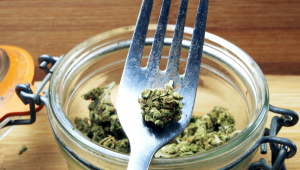

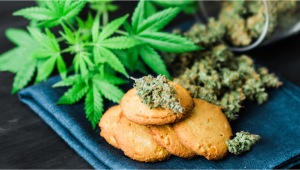


Comments